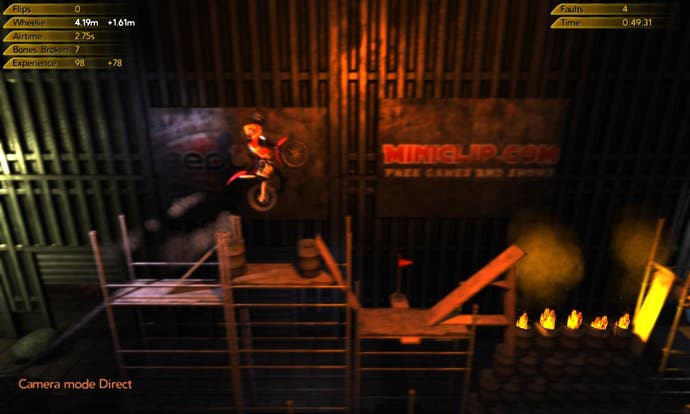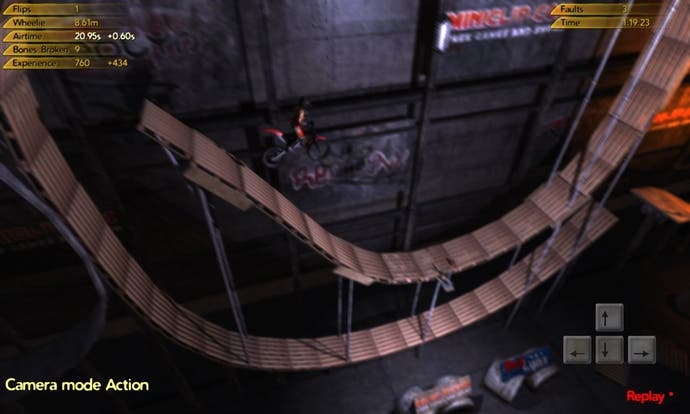RedLynx Trials 2: Second Edition
Trials trial version also available!
Playing this, I found myself thinking about comrade Dan Whitehead's tongue-in-cheek flame-bait intro to his review of the 360 Universe at War: Earth Assault. For those not into link-clicking, he was saying that whether you prefer a first-person shooter on the PC or console is a matter of preference rather than intrinsic superiority, leaving real-time strategy as "the last bastion of PC snobbery". Which isn't true, however you cut it. There's MMOs too, proper grown-up wargames and what remains of the real simulators. And as if PC owners need anything to feel snobbish about. It's all part of the fun of that big beige box.
But playing Trials 2 made me wonder whether the tide's reversing in another area. In the same way that PC owners used to be snobbish about consoles' attempts at FPS, consoles have sighed about arcade games. And...well, if I want actual arcade games, the PC's where I go to scratch that itch. And that's proper arcade games. Not bloated epics or ninth-version-in-series franchise servicing, but ones where people take an idea and fire it as hard as they can at the target. Perversely, they're ideal PC fodder. They're possible with small teams - even a couple of people. There's no corporation in the way to make you dance through hoops - the Xbox Live Arcade is very nice, but it's just a provincial arcade compared to the PC's Disneyland of distractions. From the insane freeware shooter scene to Audiosurf outselling Call of Duty on Steam for all of February, it's all kicking off.
Which is my long way of saying that this is another awesome arcade game, and if you've got any love for a pleasure that's pure, infuriating and brilliant, it deserves your attention.

It's one of our oldest templates remixed for the Internet age. It follows the Kikstart/Stunt Biker template, where you make your way across a side-scrolling obstacle course. There are four controls - lean forward, lean back, accelerate and brake. By manipulating these, you have to do things like climb ramps, mount tyres and career wildly down a wooden Rollercoaster course at a significant proportion of the speed of light.
If you had to make that game with modern technology, what would you add? Well, you would increase the physics massively, creating a much more authentic experience - as authentic as a clearly artificial game concept can be, anyway. Probably a better way of describing it would be "more interesting". Oh, and the physics clearly has to go to work on the ragdolls, meaning that when you misjudge a gap and slightly over-accelerate there's a winceworthy collision as your rider's face hits the obstacle, while your bike happily trundles on. The first fifteen minutes of play in Trials 2, the beneficiary of these what-ifs, will be pretty much constant laughter at the ludicrousness of the collisions. In the hours that follow, there'll still be moments that force a gasp or a yelp.

And I do mean hours. Hell, I mean hours on a single jump, occasionally, when it really gets beneath your skin. It's compulsive. It's so compulsive because it strips the game completely to the bone. I said there were four controls, but there are really six. The other two are a key that jumps you back to the checkpoint, and another which restarts the course. When you're in a tricky area, or just experimenting, you'll find that a stab at those keys falls into the rhythm of play. This sort of game always has a tendency to be a particularly harsh memory and skill test, with your attempt rendered a failure - as in, it'll mean you can't beat your high score - with a single mis-step. What Trials 2 does is render that as painlessly as possible - the restart is literally instantaneous, without even a small gap to take you out of the game. Remember Stuntman: Ignition and its ilk? The problem there, in a game designed around a very similar idea, is that the game's momentum breaks every time you fail and reload. Here, there's no such problem. That the courses tend to be well-judged in terms of length is another obvious boon - from start to finish is about a minute at most, meaning that chasing a perfect no-fault run is entirely possible. And, with the inevitable failures, it eats your day up, twenty seconds at a time.








